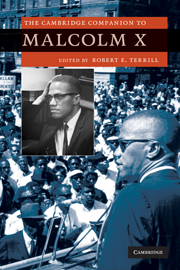Book contents
- Frontmatter
- Introduction
- 1 Malcolm X and Elijah Muhammad
- 2 Autobiography and identity: Malcolm X as author and hero
- 3 Bringing Malcolm X to Hollywood
- 4 Malcolm X and black masculinity in process
- 5 Womanizing Malcolm X
- 6 Malcolm X and the Black Arts Movement
- 7 Malcolm X and African American conservatism
- 8 Malcolm X and youth culture
- 9 Homo rhetoricus Afro-Americanus: Malcolm X and the “rhetorical ideal of life”
- 10 Judgment and critique in the rhetoric of Malcolm X
- 11 Nightmarish landscapes: geography and the dystopian writings of Malcolm X
- 12 Afrocentricity and Malcolm X
- 13 Malcolm X in global perspective
- 14 The legacy of Malcolm X
- Guide to further reading
- Index
10 - Judgment and critique in the rhetoric of Malcolm X
Published online by Cambridge University Press: 28 May 2010
- Frontmatter
- Introduction
- 1 Malcolm X and Elijah Muhammad
- 2 Autobiography and identity: Malcolm X as author and hero
- 3 Bringing Malcolm X to Hollywood
- 4 Malcolm X and black masculinity in process
- 5 Womanizing Malcolm X
- 6 Malcolm X and the Black Arts Movement
- 7 Malcolm X and African American conservatism
- 8 Malcolm X and youth culture
- 9 Homo rhetoricus Afro-Americanus: Malcolm X and the “rhetorical ideal of life”
- 10 Judgment and critique in the rhetoric of Malcolm X
- 11 Nightmarish landscapes: geography and the dystopian writings of Malcolm X
- 12 Afrocentricity and Malcolm X
- 13 Malcolm X in global perspective
- 14 The legacy of Malcolm X
- Guide to further reading
- Index
Summary
It is possible to judge Malcolm X a failure. His many admirers can point to no law that he changed, to no sustainable movement that he established, nor even to a lunch counter that he desegregated. He never led his followers in large-scale collective political action, never organized a mass protest march, and never was associated with the passage of any piece of legislation designed to improve the condition of African Americans. What Malcolm did do was talk, and both during his lifetime and since, this talk has been criticized as taking the place of real political action. Whitney Young, for example, the head of the National Urban League, once complained that Malcolm “never got anybody a job or decent housing. . .but you could find his name in the TV Guide program listings more times than Johnny Carson's.” Such assessments stem from assumptions about the function of public address that must be modified before we can appreciate Malcolm's unique contributions to political culture. Because his legacy consists primarily of all those words, in order to assess it in any meaningful way we need first a more robust way to assess the impact of those words. Malcolm did his political work by filling the newspapers and airways with ideas, not by crowding the streets and jails with bodies. As A. Peter Bailey, who worked closely with Malcolm, put it: “When someone asks, 'what did he leave, there are no buildings, no this, no that,' I say, 'Minds. He left minds.'”
- Type
- Chapter
- Information
- The Cambridge Companion to Malcolm X , pp. 125 - 136Publisher: Cambridge University PressPrint publication year: 2010



